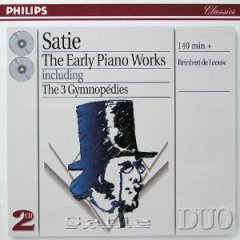Satie - The Early Piano Works (de Leeuw) [1998]
Satie - The Early Piano Works (de Leeuw) (1998)

CD1
1. Gnossiennes - No. 1 – Lent 5:40
2. Gnossiennes - No. 2 - Avec étonnement 3:11
3. Gnossiennes - No. 3 – Lent 4:20
4. Gnossiennes - No. 4 3:09
5. Gnossiennes - No. 5 3:26
6. Gnossiennes - No. 6 2:28
7. Petite ouverture à danser - Ed. Robert Caby (1905-1992) 2:26 play
8. Prélude de la porte héroïque du ciel 5:44
9. Danses gothiques 13:36
10. Ogives - I 2:52
11. Ogives - II 4:06 play
12. Ogives - 3. 2:46
13. Ogives - IV 3:42
14. Gymnopédie No.1 6:06
15. Gymnopédie No.2 5:03
16. Gymnopédie No.3 4:58
CD2
1. 3 Sarabandes - No. 1 6:44
2. 3 Sarabandes - No. 2 7:17
3. 3 Sarabandes - No. 3 6:03
4. Sonneries de la Rose + Croix - Air de l'Ordre 5:10
5. Sonneries de la Rose + Croix - Air du Grand Maître 6:07
6. Sonneries de la Rose + Croix - Air du Grand Prieur 3:45
7. Pièces froides: - Airs à faire fuir - I. D'une manière très particulière 3:39
8. Pièces froides: - Airs à faire fuir - II. Modestement 1:51
9. Pièces froides: - Airs à faire fuir - III. S'inviter 3:39
10. Pièces froides: - Danses de travers - I 1:43 play
11. Pièces froides: - Danses de travers - II 1:26
12. Pièces froides: - Danses de travers - III 2:17
13. Prière 1:35
14. 4 Préludes - Fête donnée par des Chevaliers Normands en l'Honneur d'une jeune Demoiselle 4:17
15. 4 Préludes - Prélude d'Eginhard 2:19 play
16. 4 Préludes - 1er Prélude du Nazaréen 5:26
17. 4 Préludes - 2ème Prélude du Nazaréen 4:37
Reinbert de Leeuw – piano
Satie wrote in a variety of styles. Much of his later work (including most of the work with the humorous titles) amounts to a burlesque of salon music of the day, and tends to be charming, often affecting, but on the light side. (There are exceptions, of course, such as the Nocturnes.)
The early pieces grouped on these 2 CDs (which include the famous Gymnopedies) are in a different league. They come from a period in which Satie seemed to be working through spiritual issues, and some were written specifically for the mystical Rosicrucian Order. Satie was pushing the envelope in terms of structure and harmony (although the harmony was not dissonant, but, instead, quite similar to Debussy's experiments of roughly the same time). The music can be repititious (not unlike chant) but with subtle variations (as if a distant--and early--cousin of minimalism). Most of it tends to be meditative and quiet, relatively uncomplicated, and, in that sense, anti-virtuosic. (I should add that the Gymnopedies were among the less experimental pieces of that time, although compared to, say, Saint-Saens, they were revolutionary in their simplicity.)
I became familiar with Satie via Aldo Ciccolini's ground-breaking series of 30 years ago or so. There, as in most Satie compilations, the early work was mixed in with the later work, which had the effect (for me, at least), of causing me to not quite "get" the early work. (Ciccolini's later set devoted an entire CD to the early work, under the "Mystic Works" rubric, as I best recall, but the piano sound was very disappointing, and Ciccolini was not particularly "mystical" in his approach to the work.)
Reinbert de Leeuw's approach is either revelatory or terribly dull, depending upon who's listening. I love it. I think he's the first pianist to effectively reveal what unique and potent music this is, in part by simply slowing it down. He has a beautiful sounding piano to work with (superbly recorded), and he revels in that beauty, to our benefit. Yet I don't think the slow speed is such an issue that the listener loses track of the architecture of the pieces. It just gives you time to listen. –E. Weed
Reinbert de Leeuw is the most original piano interpret I have ever heard ! His versions of Eric Satie's famous Gymnopedies are unique, because his plays them so slowly that it is sometimes difficult to recognise them; you re-discover them as you hear him play. This is the perfect approach to play some famous pieces people have heard so many times in a refreshing way. Of course, this is different from the "classic" way to play Satie, as Philippe Entremont did in a definitive way. But Reinbert de Leeuw is really original : it is the slowest interpretation of Satie's pieces. There is a few seconds silence between each note.
download: uploaded yandex 4shared mediafire solidfiles mega zalivalka filecloudio anonfiles oboom
Last Updated (Wednesday, 23 April 2014 09:45)








